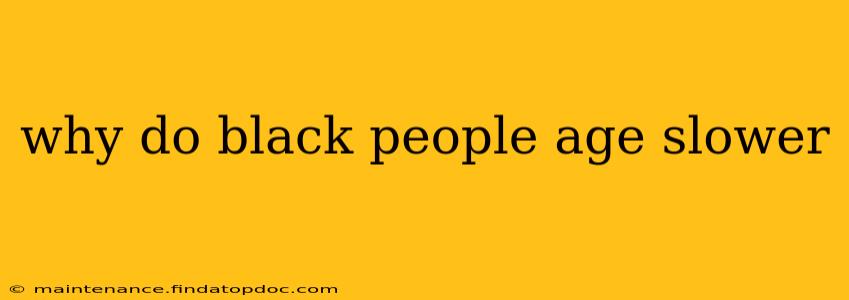Why Do Black People Age Slower? Debunking the Myth and Exploring the Nuances of Aging
The idea that Black people age slower than other racial groups is a misconception fueled by anecdotal observations and lacks scientific backing. While there are differences in health outcomes and aging processes across various populations, attributing these solely to race is an oversimplification and ignores critical factors like socioeconomic status, access to healthcare, and environmental influences. This article delves into the complexities of aging and explores why this claim is inaccurate.
What are the Factors that Influence the Aging Process?
Aging is a complex biological process influenced by a multitude of factors, including:
-
Genetics: Our genes play a significant role in determining our lifespan and how we age. Certain genetic predispositions can increase the risk of age-related diseases, while others might offer some protection. However, these genetic variations are not tied specifically to race.
-
Lifestyle: Factors like diet, exercise, smoking, alcohol consumption, and stress levels significantly impact the aging process. Healthy lifestyle choices are associated with slower biological aging and a reduced risk of age-related diseases. Conversely, unhealthy habits accelerate aging.
-
Environmental Factors: Exposure to environmental toxins, pollution, and socioeconomic disparities can significantly influence the aging process and health outcomes. Individuals in underserved communities often experience greater exposure to environmental hazards and have limited access to healthcare, affecting their healthspan and lifespan.
-
Epigenetics: Epigenetics refers to changes in gene expression that are not caused by alterations in the DNA sequence itself. Environmental factors and lifestyle choices can influence epigenetic modifications, impacting gene expression and potentially influencing the aging process.
-
Healthcare Access: Access to quality healthcare, including preventative screenings and early intervention for age-related diseases, significantly affects health outcomes and longevity. Disparities in healthcare access contribute to differences in health outcomes across various populations.
Do Black People Have Different Aging Patterns?
While there may be observable differences in certain health outcomes between racial groups, these are not solely attributable to inherent racial differences in aging. Instead, they reflect a complex interplay of the factors outlined above. For instance, some studies might show that Black individuals tend to exhibit certain biomarkers of aging later in life than some other groups. However, this does not translate to a slower biological aging process. These observed differences are more likely to be linked to:
-
Socioeconomic Factors: Socioeconomic disadvantages, including poverty, lack of access to healthy food, and exposure to environmental hazards, can significantly impact health outcomes and accelerate aging.
-
Healthcare Disparities: Limited access to preventative care and early detection of diseases can lead to poorer health outcomes and increased mortality rates.
-
Bias in Research: Studies on aging often lack sufficient diversity, leading to incomplete or biased conclusions. Further research with diverse populations is crucial to achieve a more comprehensive understanding of the aging process.
Why is the "Black People Age Slower" Claim Problematic?
This statement is problematic because it:
- Oversimplifies a complex issue: It ignores the intricate interplay of genetic, lifestyle, environmental, and socioeconomic factors that influence aging.
- Perpetuates harmful stereotypes: It reinforces inaccurate and potentially damaging generalizations about different racial groups.
- Detracts from addressing systemic issues: It diverts attention from crucial issues like healthcare disparities and socioeconomic inequalities that significantly contribute to health disparities.
In conclusion, the idea that Black people age slower is a myth. Aging is a multifaceted process shaped by numerous interconnected factors. Focusing on these factors, rather than perpetuating harmful stereotypes, is crucial for improving health outcomes and promoting healthy aging for all populations.
